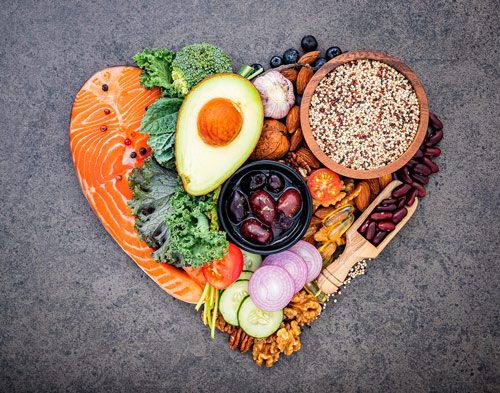
Nutrient-Dense Whole Foods
Substance use contributes to nutritional deficiencies and dysregulation of hormones that are exacerbated by the unhealthy eating habits that typically accompany addiction. When a person is in addiction recovery, eating nutrient-dense whole foods helps replenish and nourish their mind and body with vital minerals, vitamins, and other nutrients. Nutrient-dense whole foods are minimally processed, low in natural sugars and artificial sweeteners, and contain little artificial flavoring. These types of foods do not cause sharp spikes in blood sugar levels. They help keep blood sugar levels regulated, reducing mood swings, depression, and anxiety.
Nutrient-dense foods are relatively low in calories and high in nutrients. They contain complex carbohydrates, vitamins, minerals, healthy fats, and lean protein. Here are a few nutrient-dense foods that help your body heal in addiction recovery.
Salmon & Lean Poultry
Salmon and other fatty fish, such as mackerel, herring, and sardines, are among the most nutrient-dense foods. The fatty acids in these types of fish, called Omega 3 oils, foster a sense of well-being, stabilize mood, and reduce feelings of stress, anxiety, and depression. Fish and poultry contain tyrosine, an amino acid needed for the brain to produce the neurotransmitters dopamine and norepinephrine. These neurotransmitters help promote clear thinking and enhance mood. When a person is in active addiction, the substances stop their body from processing tyrosine correctly.
Potatoes
Potatoes are nutrient-dense complex carbohydrates that are nutritious and high in potassium, iron, manganese, and copper. They contain vitamin B and C and a little of almost every nutrient a person needs. Full of fiber, potatoes help fight drug and alcohol cravings and keep blood glucose levels steady. Foods high in complex carbohydrates help balance serotonin levels in the brain. Serotonin is a hormone that promotes relaxation. In addition to potatoes, complex carbohydrates include carrots and other root vegetables, legumes, bread, and pasta.
Bananas
An excellent source of potassium and magnesium, bananas are also high in vitamin B6 and C. Deficiencies of the electrolytes potassium and magnesium are common in people with substance use disorders, causing weakness, fatigue, confusion, and muscle cramps. Bananas and other fruits high in potassium, such as oranges, tomatoes, kiwis, cantaloupes, papaya, and avocados, are a source of the amino acid tryptophan. Tryptophan is necessary for the production of serotonin needed for healthy sleep.
Kale
Of all the green leafy vegetables, kale is the most nutrient-dense. It is packed with vitamins, minerals, antioxidants, fiber, and many bioactive compounds. Kale and other leafy greens, such as parsley, spinach, collard greens, dark green lettuces, and cabbages provide the amino acid L-glutamine, reducing sugar cravings common in the early phase of recovery.
Blueberries
Loaded with antioxidants, blueberries help to rebuild the immune system. Cranberries, strawberries, raspberries, red grapes, figs, red currants, cherries, pears, apricots, and watermelon are other fruits rich in antioxidants.
Tofu
Tofu is a low-fat food packed with proteins. It is easy to digest and can help restore a liver damaged by an overload of toxins from alcohol abuse. Tofu does not have any fat, allowing the liver to digest the protein with less work.
An Example of a Recovery Diet
You should always check with your medical professional to find the correct recovery diet for your needs. The following is an example of an addiction recovery meal plan taken verbatim from an article in U.S. News & World Report:
- Breakfast: A fruit smoothie that combines protein powder, unsweetened Greek yogurt or kefir, oats, a banana, blueberries and unsweetened almond milk.
- Morning snack: A piece of whole grain bread layered with peanut butter – ideally, the organic variety containing no refined sugar – and honey.
- Lunch: A large plate of dark leafy greens, like spinach, topped with tuna or chicken salad.
- Afternoon snack: A handful of nuts and sunflower seeds.
- Dinner: Salmon, quinoa (or another whole grain), Brussels sprouts and a green salad topped with pecans and goat cheese.
Help Is Available
Are you or a loved one struggling with a drug or alcohol addiction? You are not alone. Contact the professionals at English Mountain Recovery, located in the Smoky Mountains of Tennessee. Our skilled professionals will answer your questions and help you as you travel the road to recovery.
 Considering inpatient addiction treatment in Tennessee? To learn more about programs offered at English Mountain Recovery, call and speak with someone today at (877) 615-8569. We are ready to help you or your loved one recover.
Considering inpatient addiction treatment in Tennessee? To learn more about programs offered at English Mountain Recovery, call and speak with someone today at (877) 615-8569. We are ready to help you or your loved one recover.About the Author: 
Terry Hurley is a retired educational professional and freelance writer with more than fifty years of experience. A former reading specialist and learning center director, Terry loved her years working with children in the educational field. She has written extensively for print and online publications specializing in education and health issues. For the last six years, her writing focus has been on addiction and mental health issues.




